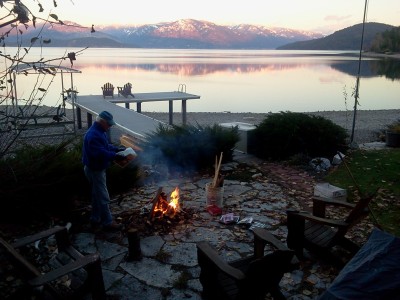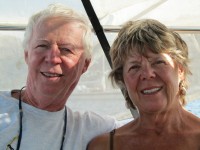Sea adventures with D & D
13 July 2012 | Green Monarchs, Lake Pend O'Relle
13 July 2012 | Sandpoint, Id
30 March 2012 | North Idaho
30 March 2012 | North Idaho
21 March 2011 | Home
12 March 2011 | Bucerias
10 March 2011 | Bucerias
07 March 2011 | La Cruz Marina
07 March 2011 | La Cruz Marina
07 March 2011 | La Cruz Marina
06 March 2011 | La Cruz Marina
05 March 2011 | Arrived in La Cruz Marina seconds ago
02 March 2011 | Barra Navidad
02 March 2011 | Barra Navidad
02 March 2011 | Melaque
01 March 2011 | Barra Navidad
27 February 2011 | Santiago Bay
25 February 2011 | Santiago Bay on 2/24
23 February 2011 | Zihuatanejo Cooking Class
22 February 2011 | Zihuatanejo Cooking Class
Lessons Learned - Whale
21 March 2011 | Home
D & D

We are publishing these thoughts about what we've learned from the experience as well as input from others:
1. Discus and plan for the unexpected to happen. One of the things that helped us, I believe, was that we both read the long article in Latitude 38 on the J-40 boat that was struck by a whale and went down in less than 45 minutes. After we read it, we sat down and mapped out a plan of what we would do in the event of an emergency. I believe that helped us to react swiftly.
2. Life Jackets - keep readily available in the cockpit when you are sailing; anything can happen, at any time even when you are a mile and a half from anchorage. You need to be able to put on without delay.
3. Keep your bilge pumps clean and test their efficiency; all crew should know how to work the manual pump; (this was not always our case, but we had just pulled both out and gone through the dirty job of cleaning the filters and installing a high water alarm, just a week before.)
4. Attempt to contain/slow down any water entering your boat. At the time of the encounter, the automatic bilge kicked on, but before even knowing that, Donna started pumping the manual and Darryl went down to the salon, checked under the boards, and ascertained that water was indeed coming in. We had our motor off; however, we turned it on and, apparently the action slowed down the water flow into the boat somewhat.
5. Make sure your VHF/SSB radios work. Unfortunately, we were having coverage problems and, had we been further out and not in such close proximity to other cruisers, it could have been fatal.
6. During the initial incident, assign one person on the boat (usually not the Captain/co-captain of affected boat) to choose a specific channel (not 16 or 22) for news/updates of the incident and to keep notes of any cruisers calling in, help offered, people to call back later.
7. Discuss all options with the seasoned cruisers that have gathered around to assist/support you. We were grateful to be able to have assistance in the thinking process of "what next." In discussing the options, we made the decision, after several boats offered to "buddy boat" with us, to attempt to make it to the La Cruz shipyards.
8. Appreciate that you have gone through a traumatic event and that your boat's integrity has been compromised. We slept little, weren't hungry, reacted to the new bumps and sounds occurring in our boat, and had concern as to whether the boat would make it to La Cruz.
9. Before you leave for any port with an "injured boat", talk through as many possible scenarios of further emergencies that could occur and how to be prepared. We discussed that fact that, day or night, at anytime, the boat's condition could worsen - greater water seepage, an unseen crack deepen, loss of motor, loss of electricity, collapse of rigging, etc. Therefore, when we left with "40-Love", heading toward La Cruz, we:
a. Pulled our dinghy behind us, so as to provide us a quick exit from the boat if necessary
b. Placed liferaft and ditch bag (along with key important documents/cell phones/billfolds in dry bag) in cockpit
c. Life jackets in the cockpit and close by at all times
d. All hatches from the cabin left open for ease of escape, if necessary
e. Very sharp knives and wire cutters for dismantling riggings if necessary
The important thing - we are safe and also very overwhelmed by the amount of support we received from total strangers as well as some friends. To mention a few: 40 - Love, Joel and Chris, our buddy boaters; Bill from Fai Sin who dove under our boat and assessed the damage; Dave and Marilee on Tamara who offered to sail with us; Ron on Whirlwind; Tom on Narina; Ken on La Scala, and Mark. There are many others who offered their assistance and warm messages of support, too numerous to list. Please know we are grateful for the outpouring of help!
Donna Foth and Darryl O'Sickey
fothcollins@msn.com
Picture is this winter from our back yard.
1. Discus and plan for the unexpected to happen. One of the things that helped us, I believe, was that we both read the long article in Latitude 38 on the J-40 boat that was struck by a whale and went down in less than 45 minutes. After we read it, we sat down and mapped out a plan of what we would do in the event of an emergency. I believe that helped us to react swiftly.
2. Life Jackets - keep readily available in the cockpit when you are sailing; anything can happen, at any time even when you are a mile and a half from anchorage. You need to be able to put on without delay.
3. Keep your bilge pumps clean and test their efficiency; all crew should know how to work the manual pump; (this was not always our case, but we had just pulled both out and gone through the dirty job of cleaning the filters and installing a high water alarm, just a week before.)
4. Attempt to contain/slow down any water entering your boat. At the time of the encounter, the automatic bilge kicked on, but before even knowing that, Donna started pumping the manual and Darryl went down to the salon, checked under the boards, and ascertained that water was indeed coming in. We had our motor off; however, we turned it on and, apparently the action slowed down the water flow into the boat somewhat.
5. Make sure your VHF/SSB radios work. Unfortunately, we were having coverage problems and, had we been further out and not in such close proximity to other cruisers, it could have been fatal.
6. During the initial incident, assign one person on the boat (usually not the Captain/co-captain of affected boat) to choose a specific channel (not 16 or 22) for news/updates of the incident and to keep notes of any cruisers calling in, help offered, people to call back later.
7. Discuss all options with the seasoned cruisers that have gathered around to assist/support you. We were grateful to be able to have assistance in the thinking process of "what next." In discussing the options, we made the decision, after several boats offered to "buddy boat" with us, to attempt to make it to the La Cruz shipyards.
8. Appreciate that you have gone through a traumatic event and that your boat's integrity has been compromised. We slept little, weren't hungry, reacted to the new bumps and sounds occurring in our boat, and had concern as to whether the boat would make it to La Cruz.
9. Before you leave for any port with an "injured boat", talk through as many possible scenarios of further emergencies that could occur and how to be prepared. We discussed that fact that, day or night, at anytime, the boat's condition could worsen - greater water seepage, an unseen crack deepen, loss of motor, loss of electricity, collapse of rigging, etc. Therefore, when we left with "40-Love", heading toward La Cruz, we:
a. Pulled our dinghy behind us, so as to provide us a quick exit from the boat if necessary
b. Placed liferaft and ditch bag (along with key important documents/cell phones/billfolds in dry bag) in cockpit
c. Life jackets in the cockpit and close by at all times
d. All hatches from the cabin left open for ease of escape, if necessary
e. Very sharp knives and wire cutters for dismantling riggings if necessary
The important thing - we are safe and also very overwhelmed by the amount of support we received from total strangers as well as some friends. To mention a few: 40 - Love, Joel and Chris, our buddy boaters; Bill from Fai Sin who dove under our boat and assessed the damage; Dave and Marilee on Tamara who offered to sail with us; Ron on Whirlwind; Tom on Narina; Ken on La Scala, and Mark. There are many others who offered their assistance and warm messages of support, too numerous to list. Please know we are grateful for the outpouring of help!
Donna Foth and Darryl O'Sickey
fothcollins@msn.com
Picture is this winter from our back yard.
Comments
| Vessel Name: | Luffin It |
| Vessel Make/Model: | Pearson 367 Cutter |
| Hailing Port: | Mazatlan |
| Crew: | Darryl & Donna |
| About: | We are a retired couple living in Sandpoint, Idaho and have a 27' Cal which we sail on Lake Pend O'Reille. We got the cruising bug after sailing on Moorings sail boats in Sea of Cortez. Have just purchased our own sailboat and will take off shortly. |
| Home Page: | http://www.sailblogs.com/member/luffinit/ |
Gallery not available
First time cruisers

Who: Darryl & Donna
Port: Mazatlan